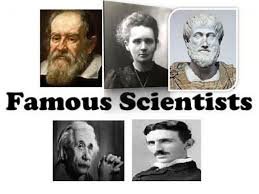Famous Scientists in the World: Contributions and Legacy
Scientists have been pivotal in shaping our world by providing groundbreaking discoveries that span various disciplines, from physics and chemistry to biology and technology. The importance of their contributions cannot be overstated as they continue to advance human knowledge and solve problems on a global scale.
Albert Einstein: Revolutionizing Physics
Albert Einstein, the father of modern physics, is best known for his theory of relativity, which includes the famous equation E=mc2E = mc^2E=mc2. His work not only changed the way we understand space and time but also laid the groundwork for modern quantum mechanics. His contributions have been foundational in numerous technological advancements such as nuclear energy and GPS.
Marie Curie: Pioneer of Radioactivity
Marie Curie was the first woman to win a Nobel Prize and remains one of the most influential scientists in history. Her research on radioactivity paved the way for advancements in cancer treatment, nuclear energy, and radiological technology. Curie’s work serves as an inspiration, especially for women in STEM fields, breaking barriers in what was once a male-dominated industry.
Charles Darwin: Theory of Evolution
Charles Darwin is renowned for his theory of natural selection, which explained how species evolve over time. His groundbreaking work, On the Origin of Species, challenged long-standing views on creation and shaped the way modern biology approaches the understanding of life on Earth. Darwin’s work remains fundamental to genetics, ecology, and evolutionary studies.
Isaac Newton: Laws of Motion and Gravity
Isaac Newton’s formulation of the laws of motion and universal gravitation is considered one of the most significant accomplishments in the history of science. His work in classical mechanics continues to influence physics and engineering. Newton’s groundbreaking discoveries laid the foundation for modern physics, astronomy, and even economics through his development of calculus.
Nikola Tesla: Master of Electricity
Nikola Tesla’s contributions to electrical engineering are immense, with inventions such as alternating current (AC), which is the basis for modern electrical grids. Tesla’s work in wireless communication and electromagnetic fields has led to innovations in radio, radar, and even early developments in modern telecommunications.

Why This News is Important
Celebrating the Legacy of Scientists
This news highlights the invaluable contributions of scientists throughout history who have revolutionized fields like physics, biology, and engineering. Understanding their work is crucial for students preparing for government exams, as science and technology are often significant components of the syllabus. Knowing the contributions of these scientists helps in understanding current technological advancements and their historical development.
Science in Government Exam Syllabi
Competitive exams like IAS, PSCS, and other government tests often include questions related to scientific achievements and their impact on society. Learning about famous scientists offers a broader understanding of scientific principles and innovation. Knowledge of their contributions can also serve as examples in essay writing and interviews during the exam process, enhancing overall preparation.
Inspirational Figures for Aspiring Scientists
This article also serves as an inspiration for those pursuing careers in science and technology. Many students look up to figures like Marie Curie and Albert Einstein, whose work not only contributed to their fields but also broke societal barriers, offering a strong motivational angle for candidates preparing for exams.
Historical Context: Scientific Discoveries that Shaped the World
Early Foundations of Science
Science has its roots in ancient civilizations such as Greece, Egypt, and Mesopotamia, where scholars like Archimedes and Pythagoras made early advancements in mathematics, astronomy, and engineering. The Scientific Revolution during the 16th and 17th centuries marked a significant shift in scientific thought, with figures like Galileo and Newton leading the way. This period laid the foundation for modern science and opened the door to further advancements.
20th Century: The Golden Age of Science
The 20th century is often referred to as the golden age of science, with the discovery of quantum mechanics, nuclear energy, and advancements in medicine. Scientists like Einstein and Curie made landmark discoveries that had far-reaching effects. This era also saw the development of technologies like electricity, radio, and early computing, which have since evolved into the digital technologies we rely on today.
Recent Developments
In recent decades, science has evolved at a rapid pace, with breakthroughs in biotechnology, artificial intelligence, and space exploration. Scientists continue to play a crucial role in solving global challenges such as climate change, pandemics, and food security. The legacy of past scientists continues to inspire current and future innovators.
Key Takeaways from “Famous Scientists in the World”
| S. No. | Key Takeaway |
|---|---|
| 1. | Albert Einstein revolutionized physics with his theory of relativity. |
| 2. | Marie Curie’s research on radioactivity advanced cancer treatment and nuclear energy. |
| 3. | Charles Darwin’s theory of evolution remains a cornerstone of biology. |
| 4. | Isaac Newton’s laws of motion and gravity laid the groundwork for modern physics. |
| 5. | Nikola Tesla’s innovations in electrical engineering are fundamental to today’s technology. |
Important FAQs for Students from this News
Who is considered the father of modern physics?
- Albert Einstein is widely regarded as the father of modern physics for his revolutionary theories, including relativity.
What are Marie Curie’s most significant contributions to science?
- Marie Curie is best known for her pioneering research on radioactivity, which led to the development of treatments for cancer and advancements in nuclear energy.
What is the significance of Charles Darwin’s theory of evolution?
- Darwin’s theory of evolution by natural selection explains how species adapt and evolve over time, forming the basis of modern biological sciences.
How did Isaac Newton influence modern science?
- Isaac Newton’s laws of motion and universal gravitation established foundational principles for classical mechanics, influencing fields such as physics and engineering.
What impact did Nikola Tesla have on electrical engineering?
- Nikola Tesla’s development of alternating current (AC) and contributions to wireless technology fundamentally shaped modern electrical systems and communication.
Some Important Current Affairs Links


















